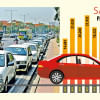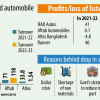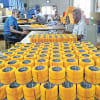Automobile policy attracts fresh investment

Fresh investment of around Tk 2,500 crore has been made in the automobile industry in the past two and half years since the formulation of the Automobile Industry Development Policy 2021, according to industry insiders.
That amount could have been as high as Tk 5,000 crore had the world economy not been adversely affected by the Russia-Ukraine war, they added.
They added that as per the policy, motorcycle manufacturers alongside three-wheeler and four-wheeler assemblers had been enjoying reduced duties on raw material imports, but electric vehicle (EV) manufacturers had been deprived of this benefit.
South Korean automotive manufacturer Hyundai and Malaysia's Proton have made investments alongside local companies such as Runner Group and Bangladesh Auto Industries Ltd (Bail).
Investment from at least six other manufacturers in four-wheeler manufacturing, including South Korea's Kia, are in the pipeline.
Runner Automobiles has already invested Tk 300 crore as they look to become the first manufacturers of three-wheelers in the country.
"There is huge potential to attract investment in this sector as the policy has opened a window for the investors," said Hafizur Rahman Khan, chairman of Runner Group.
According to him, there is a special provision for Electric Vehicle (EV) in the policy and he believed investors would be eager to fund EV manufacturing in Bangladesh.
He opined that investment would have doubled over the past three years had there not been an economic impact from the fallout of the Russia-Ukraine war.
He added that Runner Group's three-wheeler manufacturing unit was an example of what had been made possible by the Automobile policy.
"Customers can purchase at a lower price compared to imported three-wheelers," he said. "Working just one shift per day, we have the capacity to manufacture 2,500 three-wheelers per month."
Meanwhile, Fair Group started the assembly of Hyundai cars in their factory, starting with the popular 'Creta' and 'Creta Grand' sport utility vehicles (SUVs). They launched locally-made 'Creta' SUVs in January this year.
"We have established a Hyundai manufacturing plant as the government has given a number of facilities, including tax incentives and duty benefits for the import of equipment and necessary spare parts for assembling and manufacturing," said Md. Mesbahuddin, chief marketing officer of Fair Group.
He said they would announce the launch of locally assembled 'Tucson' SUVs within the next week and that they would begin to assemble sedans by April next year.
He added that they would not assemble high-end sedans initially, instead targeting first-time car buyers.
According to Mesbahuddin, Fair Group have invested around Tk 250 crore, with plans to increase investment gradually.
Regarding the potential of the manufacturing plant, he said the growing economy of Bangladesh had led to a desire among customers for brand-new cars and that locally manufactured cars offered several benefits, including being more environmentally friendly.
Customers have become more aware of the benefits of brand-new cars as well and the market size of four-wheelers has reached about Tk 20,000 crore per year.
"The market will increase in line with the economic growth of Bangladesh since the government has taken the bold initiative to develop the automobile industry," he said.
Despite the automobile market being dominated by reconditioned cars historically, changing times mean that brand-new cars will gradually take over the market, especially since reconditioned cars are often overpriced and offer no warranty.
Abdul Matlub Ahmad, chairman of Nitol Niloy Group, stressed the need for local component manufacturers to aid the development of the automobile industry. He said the government should be clear about the benefits applicable to EV manufacturers as it is a sunrise industry.
According to him, the Automobile Industry Development Policy 2021 provided a lot of benefits to fossil-fuel-based car manufacturers, but EV manufacturers and investors were deprived and were not getting any benefits despite EVs being environmentally friendly and energy-saving.
Bail and Bangladesh Lithium Battery Ltd (BLBL) are investing Tk 1,440 crore to establish the country's first EV and lithium battery manufacturing plant at Bangabandhu Sheikh Mujib Shilpa Nagar in Mirsarai, Chattogram.
"We will manufacture almost 60 percent of a vehicle's components, including lithium-ion battery, motor, controller, charger, software platform, chassis and body," he noted.
The factory infrastructure has already been constructed, with the installation of machinery underway.
Bail Managing Director Mir Masud Kabir said EV manufacturers were not getting any special treatment under the policy as it did not mention any specific facilities for them.
He said a zero import duty regime on raw materials for EV manufacturers could reduce the cost of EVs for end-users in Bangladesh.

 For all latest news, follow The Daily Star's Google News channel.
For all latest news, follow The Daily Star's Google News channel. 







Comments